

Real estate company names its first chief carbon officer. The building industry is responsible for a huge amount of the carbon emitted into the atmosphere.
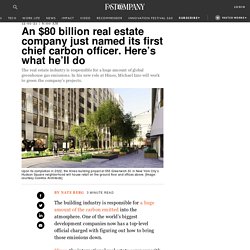
One of the world’s biggest development companies now has a top-level official charged with figuring out how to bring those emissions down. Hines, the international real estate company with more than $80 billion in assets under management, has created a new role that could soon become common in the industry: chief carbon officer. “My sole focus, 100%, is carbon emissions,” says Michael Izzo, who was recently appointed to inaugurate the role, officially known as Hines’s vice president of carbon strategy.
Formerly a vice president of construction for Hines, Izzo is now creating a company-wide strategy for reducing carbon emissions in its new construction and renovation projects around the world, including towers in New York and Shanghai, and in Bangalore, India. “Real estate accounts for about 30% of global greenhouse gas emissions,” Izzo says. Climate change is not the problem. What COP26 means for business. Even as COP26 delegates conclude negotiations, it is clear that the climate commitments launched in Glasgow will reshape the agenda for global business.
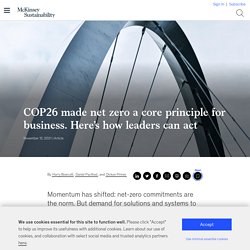
Hopes were high that COP26 would be where the world delivered action on the goals of the Paris Agreement. Debate will go on about whether official talks accomplished enough. To focus only on those developments, though, is to miss the other story that unfolded during COP26, as public-, private-, and cross-sector pledges signaled that the direction of travel is toward net zero. And in hundreds of conversations in Glasgow, executives told us and our colleagues that they expect an acceleration of climate action across the real economy: at the system level, throughout industries, and within organizations.
What Businesses Must Do to Curtail Climate Change. What did we learn from COP26? Consider the three Ms. The recently concluded COP26 in Glasgow was, among other things, a festival of acronyms.
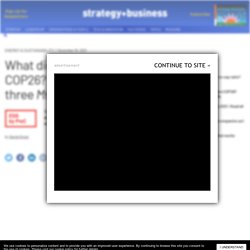
There’s COP itself (Conference of Parties). And also GFANZ (Glasgow Financial Alliance for Net Zero), ISSB (International Sustainability Standards Board), and TSVCM (Taskforce on Scaling up Voluntary Carbon Markets). Film: The Heart of a Mission. Author Talks: Can OKRs solve our planet’s climate crisis? In this edition of Author Talks, McKinsey Global Publishing’s Raju Narisetti chats with John Doerr, investor and the chairman of venture capital firm Kleiner Perkins.

In his new book, Speed & Scale: An Action Plan for Solving Our Climate Crisis Now (Penguin Random House, November 2021), Doerr offers an actionable plan to conquer humanity’s greatest challenge: climate change. What follows is an edited version of their conversation, with quotations from the book by policy leaders, entrepreneurs, scientists, and activists interspersed throughout (in blue).
Protecting people from a changing climate. The United Nations’ 2021 Intergovernmental Panel on Climate Change (IPCC) report stated—with higher confidence than ever before—that, without meaningful decarbonization, global temperatures will rise to at least 1.5°C above preindustrial levels within the next two decades.
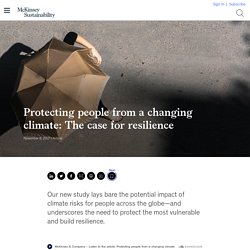
This could have potentially dangerous and irreversible effects. A better understanding of how a changing climate could affect people around the world is a necessary first step toward defining solutions for protecting communities and building resilience. As part of our knowledge partnership with Race to Resilience at the UN Climate Change Conference of the Parties (COP26) in Glasgow, we have built a detailed, global assessment of the number of people exposed to four key physical climate hazards, primarily under two different warming scenarios. This paper lays out our methodology and our conclusions from this independent assessment. IPCC ARHeadline Statements from the Summary for Policymakers. Speed & Scale: An Action Plan for Solving Our Climate Crisis Now (9 November 2021) by John Doerr.
John Doerr on fixing climate change: 'Execution is everything' In 2006, I hosted a dinner after a screening of An Inconvenient Truth, former vice president Al Gore’s seminal documentary on the climate crisis.
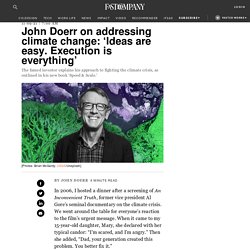
We went around the table for everyone’s reaction to the film’s urgent message. When it came to my 15-year-old daughter, Mary, she declared with her typical candor: “I’m scared, and I’m angry.” Then she added, “Dad, your generation created this problem. You better fix it.” The conversation stopped cold. As a venture capitalist, my job is to find big opportunities, target big challenges, and invest in big solutions. Author Talks: There is no vaccine for climate change. In this edition of Author Talks, McKinsey Global Publishing’s Raju Narisetti chats with Katharine Hayhoe, chief scientist for The Nature Conservancy.
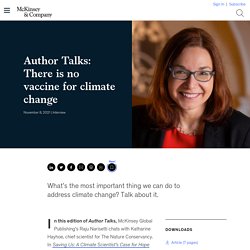
In Saving Us: A Climate Scientist’s Case for Hope and Healing in a Divided World (Simon & Schuster, September 2021), Hayhoe looks at science, faith, and human psychology and shows how small conversations can have astonishing results when it comes to influencing change. An edited version of the conversation follows. Is there anything hopeful these days about our planet’s climate crisis? As a climate scientist, I don’t find a lot of hope in the science itself because it often seems like every new scientific study shows us that the climate is changing faster or to a greater extent than we thought or affecting us in new ways.
COP26: The Most Critical Climate Change Conference Since the Paris Agreement. An executive’s guide to climate technology. New technologies represent a critical part of the world’s decarbonization tool kit—and the world does not yet have all the technologies that it would need to solve the net-zero equation by balancing sources and sinks of greenhouse-gas (GHG) emissions.
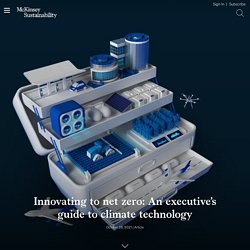
The good news: McKinsey research on Europe’s net-zero pathway suggests that climate technologies that are already mature could, if deployed widely, deliver about 60 percent of the emissions abatement that will be needed to stabilize the climate by 2050. The challenge is that further abatement must come from climate technologies that aren’t quite ready, including 25 to 30 percent from technologies that are demonstrated but not yet mature and another 10 to 15 percent from those still in R&D.
ESG Investor Survey: The economic realities of ESG. For companies stretching to find their way amid similar trade-offs, our survey points to a few actions leaders can take immediately that will advance their ESG agendas and bring their investors and other stakeholders with them along on the journey. 1.
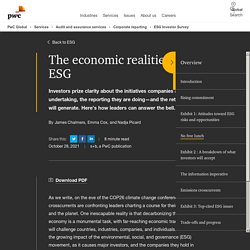
Harness the power of the C-suite. In our survey, 82% said companies should embed ESG directly into their corporate strategy. Investors also emphasized the importance of leadership from the top team, starting with the CEO. The chief executive is particularly well-positioned to communicate the importance of ESG to all stakeholders—including customers, employees, and shareholders—while making difficult resource-allocation trade-offs associated with ESG initiatives. A framework for leaders to solve the net-zero equation. As leaders prepare for COP26 at the end of this month, the need for addressing the looming climate crisis seems to be grasped more broadly than ever before.

Already, 74 countries—accounting for more than 80 percent of global GDP and almost 70 percent of global CO2 emissions—have put net-zero commitments in place. And more than 3,000 companies have made net-zero commitments as part of the United Nation’s “Race to Zero” campaign. Capital markets are increasingly building emissions risk into asset prices, and venture investments in transition technologies are at an all-time high.
For their part, an ever-greater number of companies are recognizing how shifting investor preferences—as well as changes in technology, regulation, and consumer behaviors—are changing the basis for competition and are calling for an altogether greater level of global and local collaboration. Henry Mintzberg. TED by Kristen Bell + Giant Ant: TED by Kristen Bell + Giant Ant: From the astronauts to humanity itself, ‘Earthrise’ has left an indelible mark. From outer space, Earth looks uninhabited. Its marbled surface reveals little about the richness and complexity of life on Earth.
Countries, cities, boundaries and people are invisible to the naked eye, along with the barriers of politics and religion. From out there, Earth – so inexhaustibly vast to human beings – is little more than a ‘pale blue dot’, as Carl Sagan put it. Its tiny illuminated sphere hangs, lonely as a cloud, in an almost infinite Universe. Why is 1.5 degrees such a big deal? The ESG transformation - how to embrace it? We believe these crosscurrents are coming together to propel the next wave of corporate transformation: the ESG transformation.
Like digital, ESG has the potential to revamp how successful organisations plan, implement and operate. Also like digital, ESG is a sprawling topic, making it challenging for organisations to know where to begin. In the case of digital, that uncertainty led many organisations to start small: they put a toe in, launching pilot after pilot—learning in the process, but also running the risk of being overtaken by more ambitious competitors who were quicker to grasp the opportunity to reimagine their business digitally. Today, most management teams realise that capturing the true potential of digital calls for an all-in approach—a comprehensive program in which digital touches all aspects of the company, every business unit and function. Digital doesn’t just enable you to do the same thing faster—it changes what you do. Strategy. Can we get more people to care about the climate crisis?
This story is part of Fast Company‘s Climate Change Survival Plan package. As time runs out to prevent climate catastrophe, we’re looking at what we need to do now to safeguard our future. Click here to read the whole series. This is a state with a fierce sense of identity. “Remember the Alamo” and all that. COP26: a glossary of climate change terminology. How to survive climate change. On June 30 in the tiny mountain town of Lytton, Canada, after three days of record-breaking heat that peaked at 121.3 degrees Fahrenheit, residents suddenly started to see the valley below the town fill with smoke. “We were trying to check if there were any emergency orders or any information that was happening,” Gordon Murray, a town council member, later told CBC News. “We could see that there was a lot of smoke but couldn’t find anything, and then the cell service died, and the power went out, and we knew that it was serious.”
Murray and his partner gathered up their pets—though one cat couldn’t be found, and had to be left behind—and got in their car and started to drive, without knowing which direction was safe. The Path to Zero. How to talk to someone who doesn’t believe in climate change. Climate change and business: It's time for a new leadership playbook. We are in the most important decade for humankind. With eight years remaining to achieve the UN Sustainable Development Goals and deliver on the promise of the Paris Climate Agreement, we know all too well that too little action has been taken.
2021 Climate Check: Businesses views on environmental sustainability. Ensuring adaptation and resilience to climate change. How to accelerate climate action. September 19, 2021Streaming services and TV channels saw huge spikes in consumption amid pandemic lockdown measures, as viewers turned to entertainment for respite from a challenging reality. Ahead of tonight’s awards ceremony recognizing the shows that moved us most, revisit our research to understand the lived experience of Black professionals in film and TV, and explore other industry insights, including: how the film and TV ecosystem can advance racial equity in entertainment and beyond the impact of digital streaming services on live entertainment and traditional media how literature—and TV binge-watching—can spark creativity and promote personal growth the importance of talent acquisition in the technology, media, and telecom sector Black representation in film and TV: The challenges and impact of increasing diversity.
Biophilic design has a long history and an even bigger future. Leading a New Era of Climate Action. Climate change is a global emergency. This is Why We Should Stop Calling it Climate Change. Podcast: Imagining Climate Futures with Kim Stanley Robinson. Extreme heat is becoming more frequent—and our infrastructure is going to need to adapt. Most people don't really understand how climate change works. We know the climate is changing.
This is how climate change is reshaping the entire planet. We know the climate is changing. Our Iceberg Is Still Melting. Does Capitalism Need a Soul Transplant? How To Protect The Planet - Pressures of Climate Change. Accelerating our path forward for sustainable business. Our Iceberg Is Still Melting. America 2021: Renewing the nation’s commitment to climate action. Climate change: 'It’s like waking up in the middle of the night, seeing your house on fire, then deciding to wait 10, 20 or 30 years before you call the fire department.' - Greta Thunberg. The Story of Pollution - Getting past the pandemic. The 1.5-degree challenge. Lead for the Planet: Five Practices for Confronting Climate Change (1 September 2020) by Rae Andre. Becoming the Change: Leadership Behavior Strategies for Continuous Improvement in Healthcare (1 September 2020) by John Toussaint and Kim Barnas.
A New Approach to the Intractable Problem of Climate Change. Global Warming: What We Got Wrong. How business leaders should confront climate risk. Addressing climate change post-coronavirus. Greta Thunberg's message on #EarthDay. How to Change Course on Climate. These 8 maps show the massive drop in smog caused by the coronavirus. Addressing climate change post-coronavirus. 4 ways to reboot the economy that fix the climate at the same time. Greenwashing: is it always a bad thing? How the climate fight could mimic the coronavirus fight. Flying planes at different altitudes can help reduce warming. Climate Change Is Transforming the Economy. How Will Your Company Adapt? Edete's pollinating machine replaces bees. Water is a vital resource: we have to stop taking it for granted.
People don't believe their coastal homes will end up underwater. By 2025, Ørsted plans to be the first carbon neutral utility. This factory in the Ivory Coast is turning plastic waste into classrooms Thomson Reuters Foundation. Burning Planet: Climate Fires and Political Flame Wars Rage - Press release. Nature Risk Rising: Why the Crisis Engulfing Nature Matters for Business and the Economy. Climate risk and response. New report catalogs growing climate risks. UN Envoy: ocean changes like science fiction. As bushfire and holiday seasons converge, it may be time to say goodbye to the typical Australian summer holiday. A radical plan to end plastic waste. The future of oil and gas is now: How companies can decarbonize. 3M invents a new way to ship products. Johan Rockström: 5 transformational policies for a prosperous and sustainable world.
Our Planet: Our Business, and our conversations.